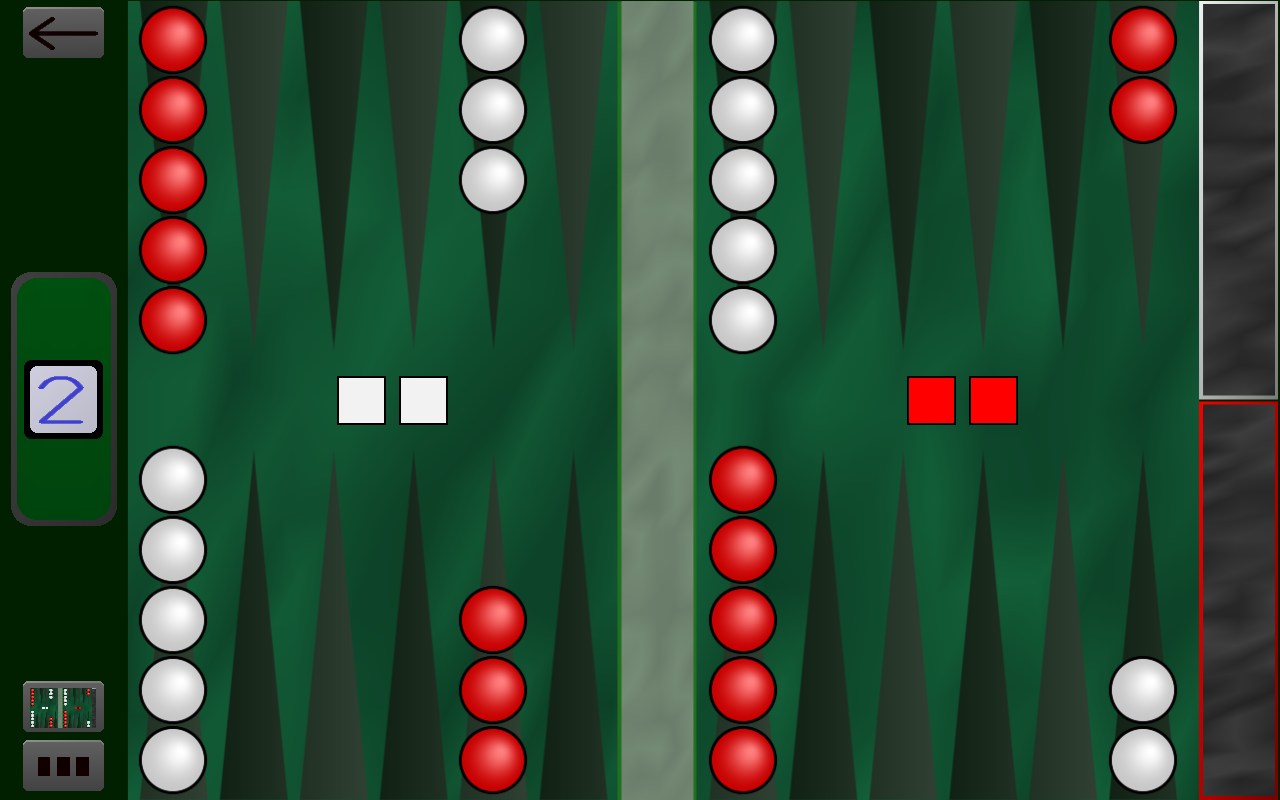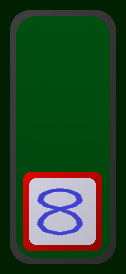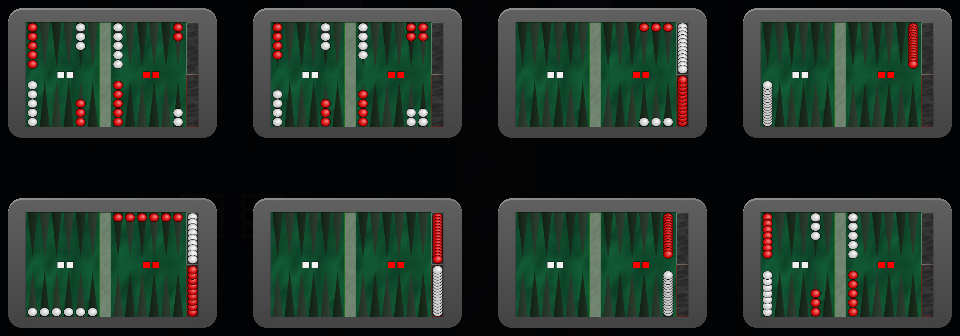Freeform Backgammon Help Page
Freeform Backgammon is an Android application that lets you play backgammon and many of its variations. Freeform Backgammon presents you with the dice, board, and checkers just as a real backgammon set does. You need to bring the players and the rules.
Freeform Backgammon enforces very few rules (just that checkers have to be on a point, the bar, or in a tray). This means you can play almost any variation of backgammon you know.
Freeform Backgammon does not have support for a computer player (no AI), you must provide an opponent. Freeform Backgammon does not support play over the network, all players must be local.
Freeform Backgammon is compatible with a wide range of Android devices, but is best suited to displays at least four inches (or 10 centimeters) diagonally. On smaller displays the checkers are necessarily smaller and may become too small to interact with reliably.
Freeform Backgammon uses Google Analytics to track installations and aggregate usage data (no personally identifying information is collected). You can choose to disable this network usage in the options menu.

Moving checkers
 There are three ways to move a checker in Freeform Backgammon.
There are three ways to move a checker in Freeform Backgammon.
- Select & tap: Select a checker by tapping it (or tapping the point, bar or tray holding a checker). The checker will be highlighted. Tap a destination (a point, the bar, or a tray) and the checker will be moved to that location. You can select multiple checkers on a single point, bar or tray, and move them all together.
- Select & drag: Select a checker by tapping it (or tapping the point, bar or tray holding a checker). The checker will be highlighted. Now drag that checker to a destination (a point, the bar, or a tray). You can select multiple checkers on a single point, bar or tray and drag them all to one destination.
- Drag: Simply drag a checker, without selecting it, from one location to another.
Rolling Dice

To roll the dice, just tap them.
Feel free to use your own dice and ignore the virtual ones.
Undo
 When tapped, the undo button will undo
the last change to the board (one roll of the dice, one move of a checker or one change
to the doubling cube).
When tapped, the undo button will undo
the last change to the board (one roll of the dice, one move of a checker or one change
to the doubling cube).
Doubling Cube
 The doubling cube is used by players to change the value of a game in a
multi-game series. Most players will not need it, and you can hide it on the
Options Menu.
The doubling cube is used by players to change the value of a game in a
multi-game series. Most players will not need it, and you can hide it on the
Options Menu.
You can change the value on the face of the doubling cube by swiping left or right from the cube.
You can change the ownership of the cube, by dragging it up or down.
Layouts Menu
 The layouts menu provides eight buttons that will quickly set up the checkers
for a new game in the shown layout (it will also reset the doubling cube, and blank the dice).
The layouts menu provides eight buttons that will quickly set up the checkers
for a new game in the shown layout (it will also reset the doubling cube, and blank the dice).
Layout Choices

The above buttons correspond to the initial layouts of the following backgammon variations:
- Standard backgammon
- Nackgammon
- Hyper-backgammon
- Narde
- Chasing The Girls
- Acey-Deucey
- Plakoto
- Blast-off
- ???
- From the traditional layout, players move checkers in opposite
directions based on the pair of dice rolled. Checkers can be hit and
sent to the bar. A doubling cube can be used to track how many points
the game is worth.
If you're new to backgammon or unclear on the rules of standard
backgammon, there are
lots
of great tutorials available on the internet.
- Plays like traditional backgammon, but the initial layout in
Nackgammon is slightly different with more checkers in the back quadrant.
More details and rules can be found
at bkgm.com.
- For a very fast game. The game is played with only three checkers per
side, but other than this initial layout, the rules are the same as for
traditional backgammon.
- Unlike traditional backgammon, in Narde all checkers move
in the same direction. Also, there is no "capturing" of checkers, its
simply illegal to move onto an occupied point.
Fevga and Moultezim are similar variations.
More detailed rules are readable
at bkgm.com.
- In this game, checkers move in the same direction
(counter-clockwise), and only six are placed on the board (the others
are not in play). To move, only 1s and 6s are important, other values
on the dice are ignored. A point may only contain one checker, and
instead of hitting, a checker will freely slide past its own checkers or
remove an opponents checker from the game entirely. Checkers circle the
board indefinitely until all are removed. When a player has only 1
checker remaining, the rules change! See the
bkgm.com
description for more details.
- In Acey-Deucey, all checkers start off the board (in the opponents
tray in Freeform Backgammon) and must be moved onto the board. Play is
generally the same as standard backgammon, with the exception that a
roll of "Acey-Deucey" (1-2) the player gets to move 1-2 and gets to
move their pick of doubles. More detailed rules and
additional Acey-Deucey variations can be found at
bkgm.com
or
Wikipedia.
- Checkers move as in traditional backgammon, but the initial layout has
all checkers on the farthest point from the goal. There is no
'hitting', instead a checker may "pin" a opponent's checker if it is
alone on the point. A pinned checker cannot move while pinned. There
are special rules for pinning the last checker on an opponent's starting
point. See the
bkgm.com
description for more details.
- Designed to introduce young players to backgammon, Blast-off has a
slightly different initial setup than traditional backgammon and does
not allow 'hitting' other checkers. Otherwise, play is similar to
traditional backgammon. More detailed rules are readable
at bkgm.com.
- Of course you can always make up your own variation and rules with
Freeform Backgammon and you do not need to use any of these provided
layouts.
Options Menu
The options menu presents gameplay toggles and support buttons.
Option Toggles
 These toggles control use of audio, use of the network (for analytics
support), and display of the doubling cube.
These toggles control use of audio, use of the network (for analytics
support), and display of the doubling cube.
The network toggle controls usage of Google Analytics support in Freeform Backgammon. This online service enables Bitiotic to learn about the types of devices Freeform Backgammon is used on, and which parts of Freeform Backgammon players interact with. No personally identifying information is shared, only aggregate information (like the number of times checkers were moved or dice were rolled in a game). The network is also used to send crash reports to bitiotic.com in case of a fatal error in the application.
Support Buttons
 The first button will compose a draft support email to Bitiotic, and the
second will open a web browser on this page.
The first button will compose a draft support email to Bitiotic, and the
second will open a web browser on this page.
If you have any questions or comments, please contact freeform.support@bitiotic.com.
